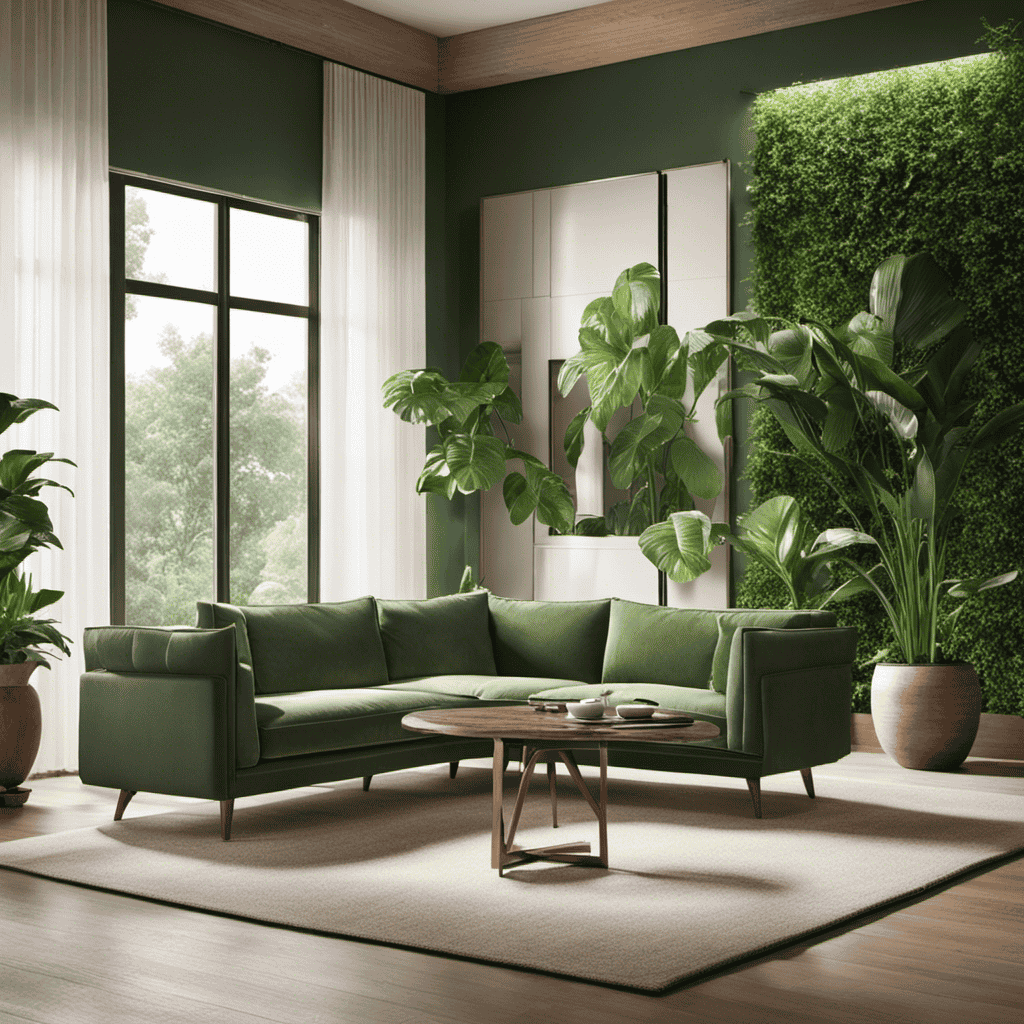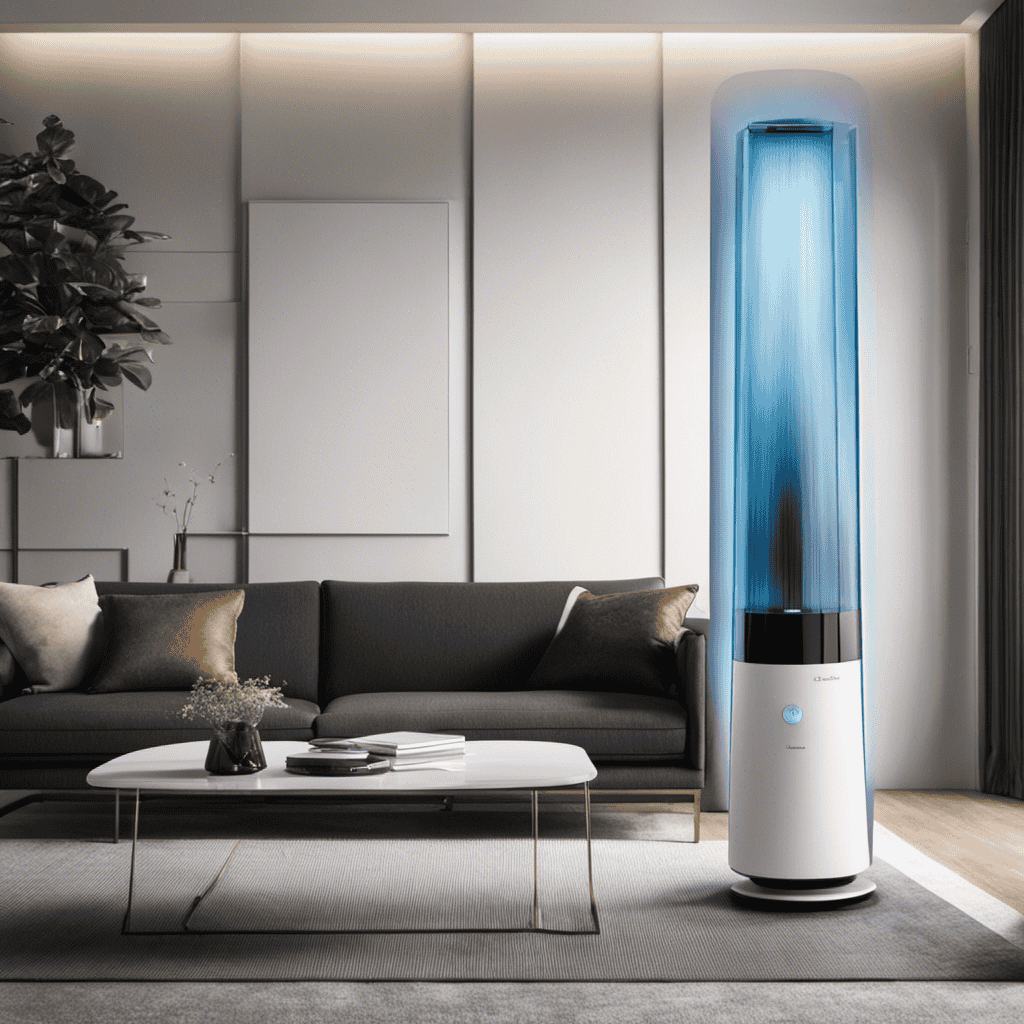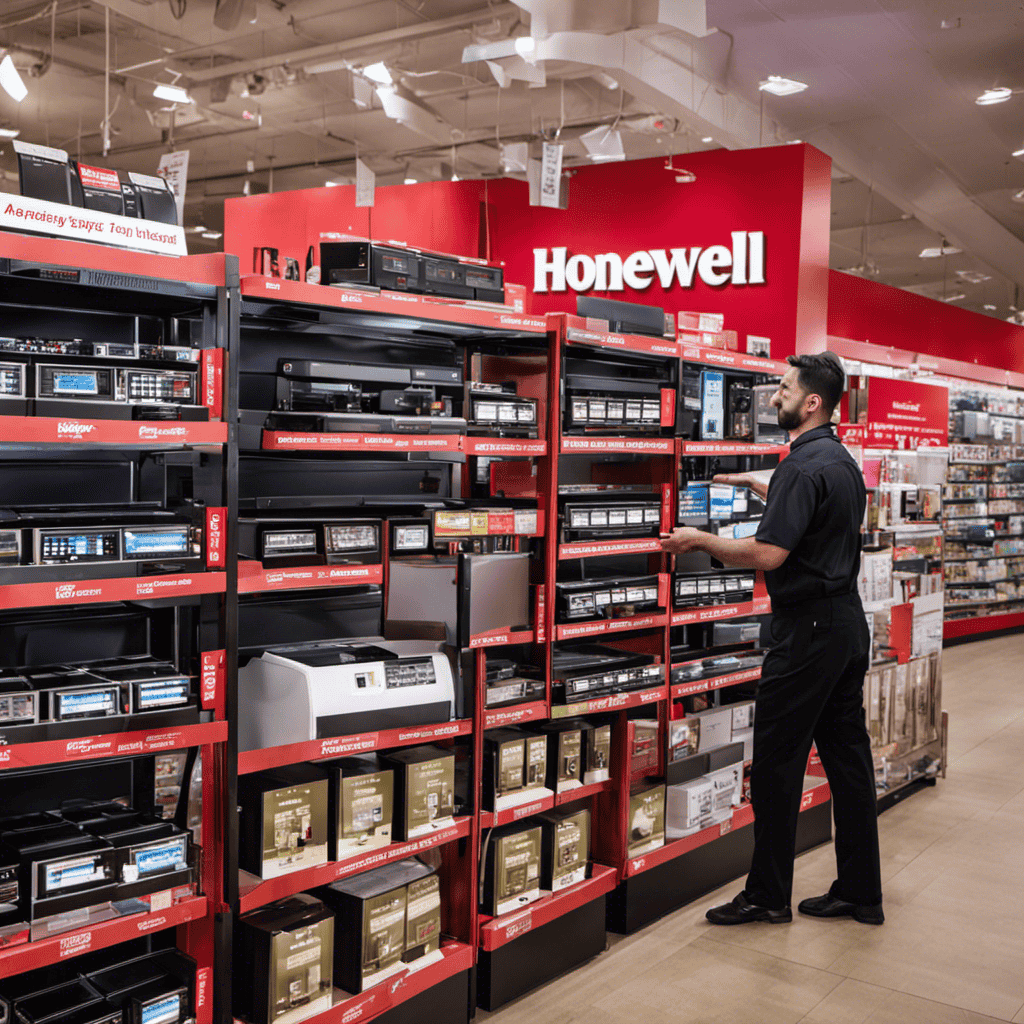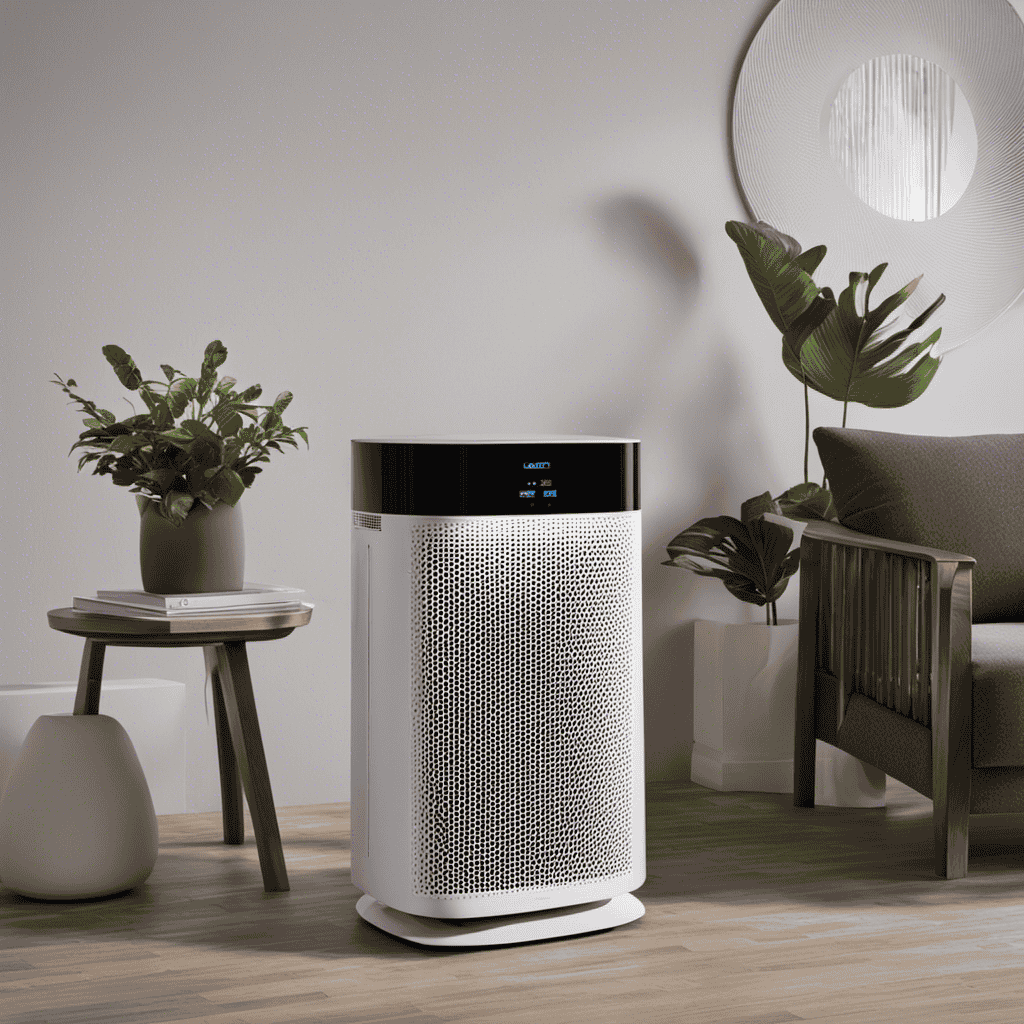I will always remember the moment I experienced the impact of an air purifier. It truly felt like a breath of fresh air. However, as I immersed myself further into the realm of purified indoor air, I discovered there was much more for me to understand.
How often should I run my air purifier? Is there a specific schedule I should follow? In this article, we’ll explore the factors to consider, recommended daily usage, and tips for evaluating air quality.
So, let’s dive in and clear the air on this important topic.
Key Takeaways
- The recommended daily usage of an air purifier is 8-12 hours, but longer usage may be beneficial for allergies and asthma.
- Running the air purifier throughout the night can provide continuous filtration, allergy relief, and improved sleep quality.
- Air purifiers should be used more frequently for allergies and sensitivities, and placed strategically for effective circulation.
- Regular filter replacement and maintenance routines are essential for optimal performance, improved air quality, and cost-effectiveness.
Factors to Consider
When considering how often to run your air purifier, you should take into account factors such as the size of your space and the level of pollutants present.
The recommended placement for an air purifier is in a central location, away from walls or furniture, to ensure optimal airflow and coverage.
Larger rooms may require longer running times to effectively clean the air, while smaller rooms may need shorter intervals.
Additionally, the level of pollutants in your space should influence the frequency of air purifier usage. If you live in a highly polluted area or have specific indoor air quality concerns such as allergies or asthma, running the air purifier more frequently may be beneficial.
However, it is important to consider the noise level of the air purifier, especially if you plan on running it while sleeping or working. Some models have a quiet mode or adjustable fan speeds to reduce the noise level.
Ultimately, finding the right balance between air purification and noise level is crucial for a comfortable and healthy living environment.
Recommended Daily Usage
To maximize the benefits of your air purifier, it’s recommended to use it daily. Regular usage ensures that the air in your home remains clean and free from pollutants.
Evaluating the effectiveness of an air purifier requires considering factors such as the size of the room, the type of pollutants present, and the efficiency of the specific air purifier model. However, research has shown that air purifiers can provide numerous health benefits.
They can help reduce symptoms of allergies and asthma by removing allergens and irritants from the air. Air purifiers can also eliminate harmful particles such as smoke, dust, and pet dander, which can improve overall indoor air quality and promote better respiratory health.
Daily usage of an air purifier can help maintain a healthier living environment for you and your family.
Evaluating Air Quality
Assessing the quality of your indoor environment is crucial for ensuring that you and your family are breathing clean and healthy air. Evaluating the effectiveness of your air purifier can help you determine if it’s truly improving the air quality in your home.
Here are four key factors to consider when evaluating the effectiveness of your air purifier:
- Airflow: Is the air purifier capable of circulating the air in the room effectively?
- Filtration: Does the air purifier have a high-efficiency filter that can capture a wide range of pollutants?
- Noise level: Is the air purifier quiet enough to be used in bedrooms or other quiet spaces?
- Energy consumption: Does the air purifier use energy efficiently?
By evaluating these factors, you can determine if your air purifier is providing the health benefits you and your family need.
Now, let’s discuss how to set a schedule for running your air purifier.
Setting a Schedule
Make sure to consider your daily routine and the times when you spend the most time at home. Setting reminders for running your air purifier can help ensure that you consistently maintain a clean and healthy indoor environment.
It is important to keep in mind that air purifiers consume energy, so you should consider optimizing their usage to minimize unnecessary energy consumption. According to research, running an air purifier for about 8-12 hours a day is generally sufficient to achieve good air quality.
However, if you or someone in your household suffers from allergies or asthma, it may be beneficial to run the air purifier for longer periods, such as overnight. By setting a schedule and sticking to it, you can enjoy cleaner air while also being mindful of energy consumption.
Nighttime Operation
Running your air purifier overnight can significantly improve the air quality in your home while you sleep. Here are four reasons why nighttime operation of your air purifier is beneficial:
-
Continuous filtration: Running your air purifier throughout the night ensures that the air in your home is constantly being filtered, removing pollutants such as dust, pet dander, and allergens.
-
Allergy relief: If you suffer from allergies, running your air purifier overnight can provide relief by reducing the presence of allergens in the air, allowing you to wake up feeling refreshed and symptom-free.
-
Improved sleep quality: Clean air can lead to better sleep. By removing airborne irritants, an air purifier can help you breathe easier and promote a more restful night’s sleep.
-
Noise level: Many air purifiers are designed to operate quietly, allowing you to enjoy the benefits of clean air without being disturbed by excessive noise while you sleep.
Running During Allergy Season
When it comes to running an air purifier during allergy season, it is important to consider the optimal usage frequency, allergy symptom relief, and filter replacement schedule.
Research suggests that running the air purifier consistently, preferably 24/7, can provide the best results in reducing allergens in the air.
In terms of allergy symptom relief, individuals may experience improvement in their symptoms such as sneezing, coughing, and itchy eyes with regular use of an air purifier.
Additionally, it is crucial to adhere to the recommended filter replacement schedule to ensure the effectiveness of the air purifier in capturing and trapping allergens.
Optimal Usage Frequency
Using an air purifier regularly can help maintain clean and fresh air in your home. When it comes to optimal usage frequency, here are four key considerations:
-
Room size: Determine the appropriate air purifier size based on the square footage of the room. A larger room may require a higher frequency of usage.
-
Allergies and sensitivities: If you or your family members suffer from allergies or respiratory issues, running the air purifier more frequently, especially during peak allergy seasons, can provide relief.
-
Optimal placement: Place the air purifier in a central location where it can effectively circulate the air in the room. Avoid blocking the air intake or output vents to ensure maximum efficiency.
-
Energy consumption: Keep in mind that running the air purifier continuously can increase energy consumption. Consider using it on a schedule or during times when air quality is the most compromised.
Allergy Symptom Relief
When it comes to allergy prevention, air purifiers can provide significant benefits. These devices are designed to remove allergens and irritants from the air, helping to reduce allergy symptoms and improve overall air quality.
The filters in air purifiers can capture particles such as dust, pollen, pet dander, and mold spores, all of which are common triggers for allergies. By removing these allergens from the air, air purifiers can help alleviate symptoms like sneezing, coughing, and itchy eyes.
Additionally, air purifiers can also help reduce the presence of airborne viruses and bacteria, providing an added layer of protection against respiratory illnesses.
It is recommended to run an air purifier continuously in rooms where you spend a significant amount of time, especially if you suffer from allergies.
Filter Replacement Schedule?
Regularly replacing the filters in your air purifier is essential to maintain its effectiveness in removing allergens and improving air quality. Frequent filter changes ensure that the air purifier continues to function optimally and provide you with clean and fresh air.
Here are four reasons why you should stay on top of your filter replacement schedule:
-
Improved Air Quality: By replacing the filters regularly, you ensure that the air purifier can effectively capture and remove harmful particles, such as dust, pollen, pet dander, and mold spores.
-
Allergy Relief: Clean air is crucial for allergy sufferers. Regular filter changes help reduce allergens in the air, providing relief from symptoms like sneezing, coughing, and itchy eyes.
-
Longer Lifespan: Clogged filters can strain the air purifier’s motor, leading to reduced efficiency and a shorter lifespan. Regular filter changes help prolong the life of your air purifier.
-
Cost-Effective Replacements: While frequent filter changes might seem costly, they are more cost-effective in the long run. By maintaining the effectiveness of your air purifier, you can avoid expensive repairs or early replacements.
Adjusting for Pets
If you have pets, it’s important to adjust your air purifier settings accordingly. Pet dander control and minimizing pet odors are two key factors when it comes to maintaining clean air in your home.
Pet dander, which consists of tiny flecks of skin shed by pets, can trigger allergies and asthma symptoms in sensitive individuals. To effectively remove pet dander and minimize odors, consider using a HEPA (High-Efficiency Particulate Air) filter in your air purifier. HEPA filters are designed to capture 99.97% of particles as small as 0.3 microns, including pet dander and other airborne allergens.
Additionally, activated carbon filters can help absorb and neutralize pet odors. By adjusting your air purifier settings to include these filters, you can ensure a healthier and more pleasant environment for both you and your pets.
As we move on to the next section about running in high-pollution areas, it’s important to consider how air purifiers can also be beneficial in these situations.
Running in High-Pollution Areas
To protect yourself from high levels of pollution while running, make sure to check the air quality index and wear a mask if necessary. Running in urban areas can expose you to harmful pollutants that can negatively impact your health. However, don’t let that discourage you from enjoying the many health benefits that running provides.
Here are four important tips to keep in mind:
- Plan your route wisely: Choose areas with less traffic and green spaces to minimize pollution exposure.
- Time your runs: Avoid running during peak traffic hours when pollution levels tend to be higher.
- Use a mask: Consider wearing a mask specifically designed to filter out pollutants for added protection.
- Stay hydrated: Drinking plenty of water can help flush out toxins from your body.
By following these guidelines, you can continue to reap the benefits of running while reducing the potential harm caused by pollution.
Now, let’s move on to the next section about monitoring filter replacement.
Monitoring Filter Replacement
When it comes to air purifiers, two important factors to consider are the filter lifespan and efficiency.
The filter lifespan determines how long the filter will last before it needs to be replaced, while the efficiency refers to how effectively the filter can remove pollutants from the air.
Regular maintenance routines, such as cleaning or replacing filters, are crucial to ensure the optimal performance of the air purifier and to maintain clean indoor air quality.
Filter Lifespan and Efficiency
You should regularly check the filter lifespan and efficiency of your air purifier to ensure it is working effectively. Here are four reasons why this is important:
-
Frequent Usage: If you use your air purifier often, the filters can become clogged with particles and pollutants over time. Checking the filter lifespan allows you to replace them when needed, ensuring optimal performance.
-
Prolonged Exposure: If you are exposed to indoor air pollutants for extended periods, such as in a heavily polluted area or if you have respiratory issues, it is crucial to monitor the filter efficiency. A worn-out filter may not effectively remove harmful particles, compromising air quality.
-
Allergen Removal: Air purifiers with efficient filters can effectively capture allergens like pollen, pet dander, and dust mites. Regularly checking the filter lifespan ensures these allergens are continually removed, providing relief for allergy sufferers.
-
Energy Efficiency: A clean and well-maintained filter allows the air purifier to function efficiently, consuming less energy. This not only saves on electricity bills but also reduces the environmental impact.
Checking the filter lifespan and efficiency is just one aspect of maintaining your air purifier. Let’s now discuss the importance of establishing a regular maintenance routine.
Regular Maintenance Routine
Maintaining a regular maintenance routine for my air purifier is essential to keep it running efficiently and ensure its longevity.
One crucial aspect of this routine is regular filter cleaning. Filters can become clogged with dust, dirt, and other particles over time, reducing the purifier’s effectiveness. By cleaning the filters regularly, I can remove these contaminants and improve the purifier’s performance.
Additionally, troubleshooting common issues is an important part of maintenance. Some common issues include strange noises, decreased airflow, or a malfunctioning control panel. By troubleshooting these issues promptly, I can identify and resolve any problems before they worsen.
Overall, by following a regular maintenance routine that includes filter cleaning and troubleshooting, I can ensure that my air purifier continues to function optimally and provide clean air for my home.
Frequently Asked Questions
Can an Air Purifier Completely Eliminate All Pollutants in the Air?
An air purifier can effectively reduce pollutants in the air, but it may not completely eliminate all of them. It offers benefits like improved indoor air quality and reduction in allergens and odors.
Are There Any Health Risks Associated With Running an Air Purifier for Long Hours?
There are potential side effects associated with running an air purifier for long hours. These include dryness of the skin and eyes, irritation of the respiratory system, and an increased risk of respiratory infections.
Can an Air Purifier Help Reduce the Spread of Airborne Viruses and Bacteria?
Air purifiers can effectively reduce the spread of airborne viruses and bacteria, offering numerous benefits. Research suggests that running an air purifier continuously or for several hours a day can help maintain clean and healthy indoor air.
How Much Noise Does an Air Purifier Produce During Operation?
When it comes to the noise level of air purifiers, it’s important to consider factors like fan speed and room size. On average, air purifiers produce around 30-50 decibels of noise, which is similar to a whisper or light rainfall.
Are There Any Specific Maintenance Tasks Required to Keep an Air Purifier Running Efficiently?
To keep an air purifier running efficiently, regular maintenance is necessary. This includes cleaning the filters and replacing them as recommended by the manufacturer. These tasks ensure that the air purifier continues to effectively remove pollutants from the air.
What Is the Recommended Frequency for Running an Air Purifier?
The running an air purifier schedule is typically recommended to be around 8-12 hours a day to effectively clean the air in your home. This frequency allows for the air purifier to continuously filter and circulate the air, helping to reduce indoor air pollutants and allergens.
Conclusion
In conclusion, running an air purifier regularly can greatly improve indoor air quality and promote a healthier living environment. While some may argue that it could be costly to run constantly, the benefits of breathing clean air outweigh the potential expenses.
Imagine waking up each morning feeling refreshed and breathing in air that is free from allergens, pollutants, and pet dander. Investing in an air purifier and using it consistently will undoubtedly contribute to a happier and healthier lifestyle.










